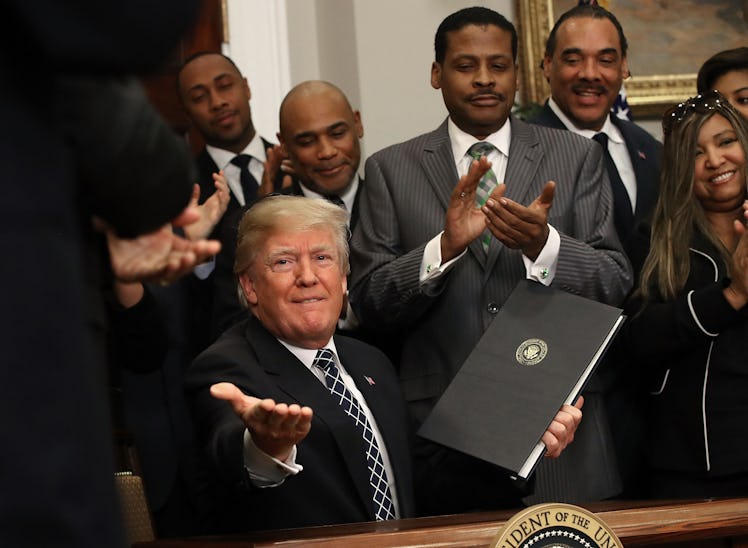
No, You Can't Use Racial Slurs Just Because You're Mad At Trump
If you pay enough attention to what happens after a controversial quote from President Donald Trump makes headlines, you might notice a certain routine. The president says something clumsy and offensive that prompts a conversation on racism. In turn, people ostensibly condemning racism, but unable to grasp that Donald Trump's language is not an excuse to express their outrage without filter, trip over that outrage and make clumsy and offensive statements themselves.
That's how the cycle goes, and it reliably leads to people on the "right" side of these discussions making the wrong points, which ultimately lure us into ignoring the big picture.
It happened after Trump's Access Hollywood tape was revealed — remember "grab 'em by the..." you know — and it happened again on Thursday night, Jan. 11, after a Washington Post report quoted the president as questioning why the United States should accept more people from "sh*thole countries" while suggesting more immigrants from places like Norway should be brought in instead. (Trump has denied that he used that language.)
For the sake of societal progress, people critiquing this president should be held to a much high standard than the one the president has set himself.
The report became a trending topic for cable news and social media, thus triggering the cycle. Among the highlights? An exchange between CNN counterterrorism expert Phil Mudd, a former CIA official, and CNN host Don Lemon.
"So let's be clear: a white honky from Norway can come here but a black dude from Haiti can't," an incredulous Mudd told Lemon. "What does that tell you in an America that in one generation called you a n*****? What does that tell you, Don?"
Mudd's commentary — which featured him using many other slurs that were used against different groups of immigrants in the past — was a clear attempt at rebuking Trump. It also happened to be a moment in which one white man used the N-word to a black man's face. At the very least, it was clumsy.
There can be an inclination to let this type of clumsiness slide, whether it manifests on TV or in our personal conversations, especially if the clumsiness occurred with good intentions. Besides, what Mudd said — and what others say while they #DESTROY and #SHADE Trump — is nothing compared to what the president himself says.
That forgiving rationale is understandable, but it is not at all the best idea. In fact, the opposite idea is much better. For the sake of societal progress, people critiquing this president should be held to a much high standard than the one the president has set himself.
The stakes are that high.
This presidency — with all its outrageous, undeniable, and overt offenses — has forced us to have conversations about racism and sexism that we might have otherwise found excuses to avoid in the past. That's a huge opportunity. Now is the best time to clearly express what is wrong and what is right about the way different people are treated and to intelligently debate how people in power either promote or discourage that treatment.
That's the real reason why Mudd's commentary was inadequate; it was more about fiery style than substance. The big takeaway from the conversation with Lemon was not any actual substance on an important topic. The takeaway was that Mudd was mad.
This isn't to pile on one particular commentator either. There are sure to be people who appreciate any semblance of anti-racist rhetoric on TV or at work.
But The Washington Post's report gives America a chance to do more than express sentiment and passion and anger at another singular, controversial comment.
We can focus on the bigger picture. We can aim to talk about how people of color are viewed in certain ways, and exactly why they are viewed those ways. We should make a clear case, in a measured way, what it is about the president's views that are problematic and consequential.
Resisting the temptation to use Trump's words as an excuse to get clumsy and vulgar ourselves is one way to stay focused on that aim.